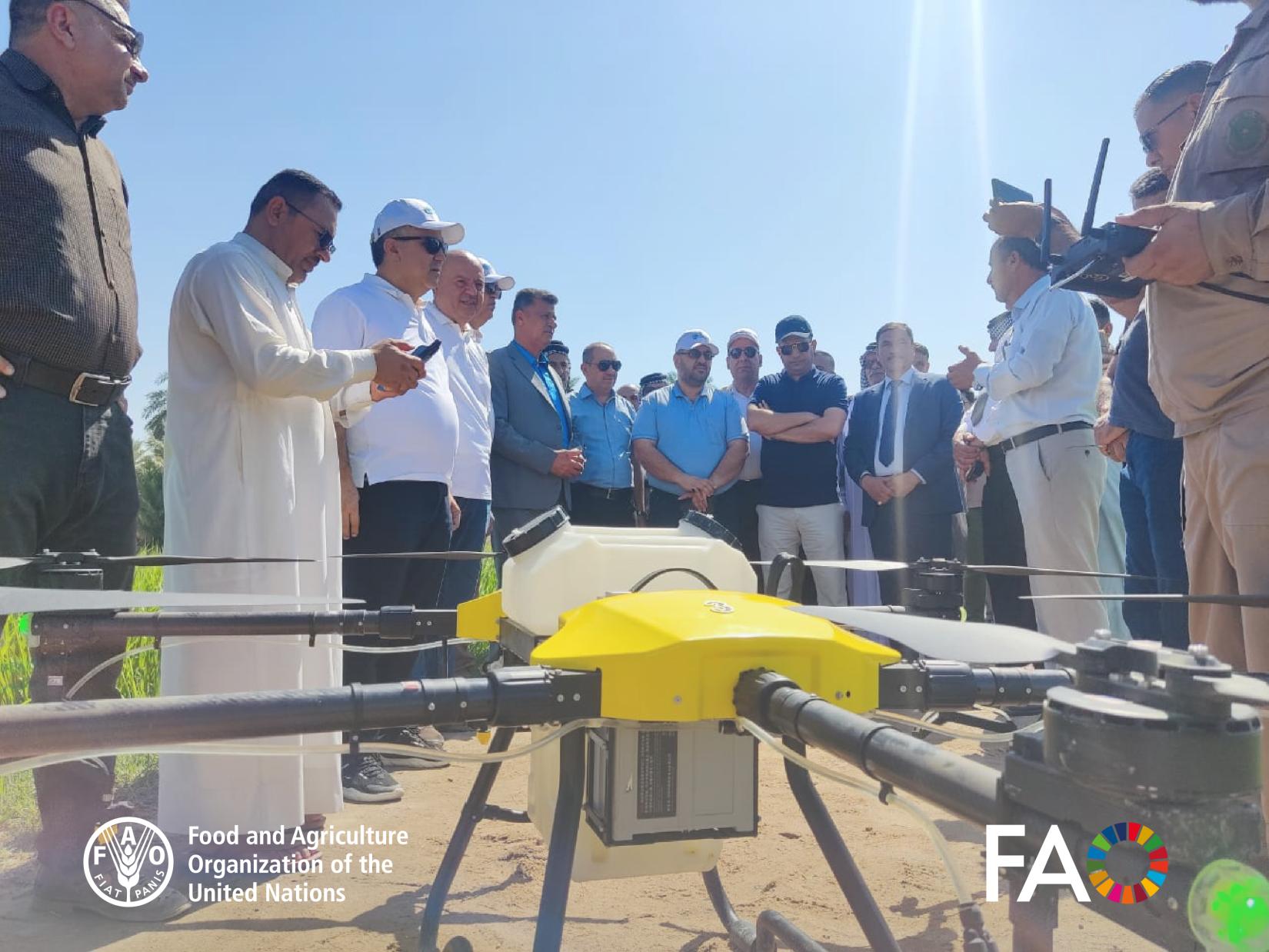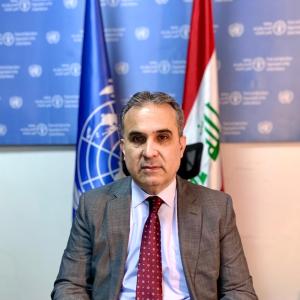FAO uses drones and climate-smart agriculture applications in rice fields
09 September 2024

Najaf, September 8, 2024
In line with scaling up climate-smart agricultural practices in rice Value Chain, the Food and Agriculture Organization of the United Nations (FAO), in cooperation with the Najaf Agriculture Directorate and with support from the Ministries of Agriculture and Water Resources and the Najaf local government, implemented a field activity to apply fertilizers using drones in transplanted rice fields using mechanical transplanting in Al-Mashkhab District
This filed activity is part of the project “Enhance climate resilience of vulnerable agriculture households in Southern Iraq through the promotion of climate smart water management and good agriculture practices in selected value chains" funded by the Swedish International Development Cooperation Agency (SIDA). The project aims to rationalize water use and improve productivity to adapt to conditions of water scarcity and climate change.
The event was attended by Dr. Salah ElHajj Hassan, FAO Representative in Iraq, Dr. Hadi Al-Yasiri, Director General of the Horticulture Department, Mr. Munir Ali, Director of the Agricultural Extension and Training Department, Mr. Munim Shahid Director of Najaf Agriculture, Mr. Farouk Al-Ghazali, Chairman of the Agriculture and Water Resources Committee in the Najaf Governorate Council, Eng. Mohammed Abdullah Mahmoud, Deputy Director General of the Operations Authority at the Ministry of Water Resources, Mr. Raed Abdullah, Deputy Director of the Water Resources Directorate in Najaf, the Najaf Agriculture Directorate team and a number of rice farmers in the region.
In this context, Dr. Salah El Hajj Hassan stated, “The FAO efforts are continuing, in cooperation with the Ministries of Agriculture / Najaf Agriculture Directorate, Ministry of Water Resources, and the local government to develop the rice Value Chain using climate-smart agriculture applications to mitigate the negative impact of climate change and water scarcity, implementing smart agricultural practices will reduce production costs and pollution, leading to increased production” he added.
Ministry of Agriculture representative acknowledged FAO efforts and emphasized the importance of adopting to smart agricultural practices will reduce pollution and improve rice Value Chain in collaboration with FAO who provides great support to the agricultural sector in Iraq in order to face the challenges of water scarcity and climate change.”
FAO recently organized a field event for rice planting using a package of technologies including mechanical transplanting in Al-Mishkhab district, which contributes significantly to saving water and agricultural inputs such as seeds, pesticides and labor costs, in addition to reducing pollution.
It is worth noting that the cultivation of rice is still done in traditional ways that depends on flooding it with water in large quantities, which prompted the Iraqi government, through the Ministry of Water Resources, to direct the adoption of modern irrigation techniques that contribute to reducing the quantities of water used in irrigation, noting that the area allowed to be cultivated with rice for the current year does not exceed 200 thousand dunams, compared to 400 thousand last year.
This initiative supports several Sustainable Development Goals (SDGs), including SDG 2: Zero Hunger, by enhancing food production efficiency; SDG 6: Clean Water and Sanitation, through the sustainable use of water resources; and SDG 13: Climate Action, by promoting practices that help farmers adapt to climate change impacts.

He started his career in 1984, as Senior Research Assistant in the Agricultural Research and Education Centre (AREC), American University of Beirut. From 1987 to 1991, he was Coordinator of the Student Training Programme, and also Agriculture and Horticultural Teacher for the Faculty of Agriculture, at the Lebanese University.
From 1991 to 1995, he worked as Agricultural Engineer at the Ministry of Agriculture, Bekaa Regional Office, Zahlah and was then assigned to the Agricultural Research Institute in the Tal Amara station, first as Head of the Crop Production Department and subsequently in charge of the Plant Protection Laboratory. From 2002 to 2006, he was Director of the Kfardane Research Station (Agricultural Research Institute). In 2008, he became Visiting Scientist at the International Maize and Wheat Improvement Centre (CIMMYT) and Coordinator of a project with the International Centre for Atomic Energy Agency, Vienna.
In 2010, he served as Advisor to the Minister for Agriculture of Lebanon. In 2011, he became President of the Pesticide Scientific Committee, Head of the Phytoplasma Committee and Director of the Agriculture and Rural Development Programme (ARDP) (EU-funded project). From 2010 to 2013, he represented Lebanon in negotiations with EU, Egypt, Jordan and Iraq. During his career, Mr Hajj Hassan also carried out a number of other functions. He represented the Lebanese Agricultural Research Institute (LARI) in several research programmes with the International Centre for Agricultural Research in the Dry Areas (ICARDA) and the American University of Beirut. He was Coordinator of the Mashreq/Maghreb project with ICARDA, representing Lebanon in the Steering Committee, as well as being the Head of the Sugar-beet Delivery and of the Wheat Delivery Committees. For a number of years, Mr Hajj Hassan worked for the preparation of FAO TCP projects and served as the National Director of a TCP project. He joined FAO in January 2014 as FAO Representative in Yemen. Mr Hajj Hassan succeeds Mr El Zubi as FAO Representative in Iraq.

